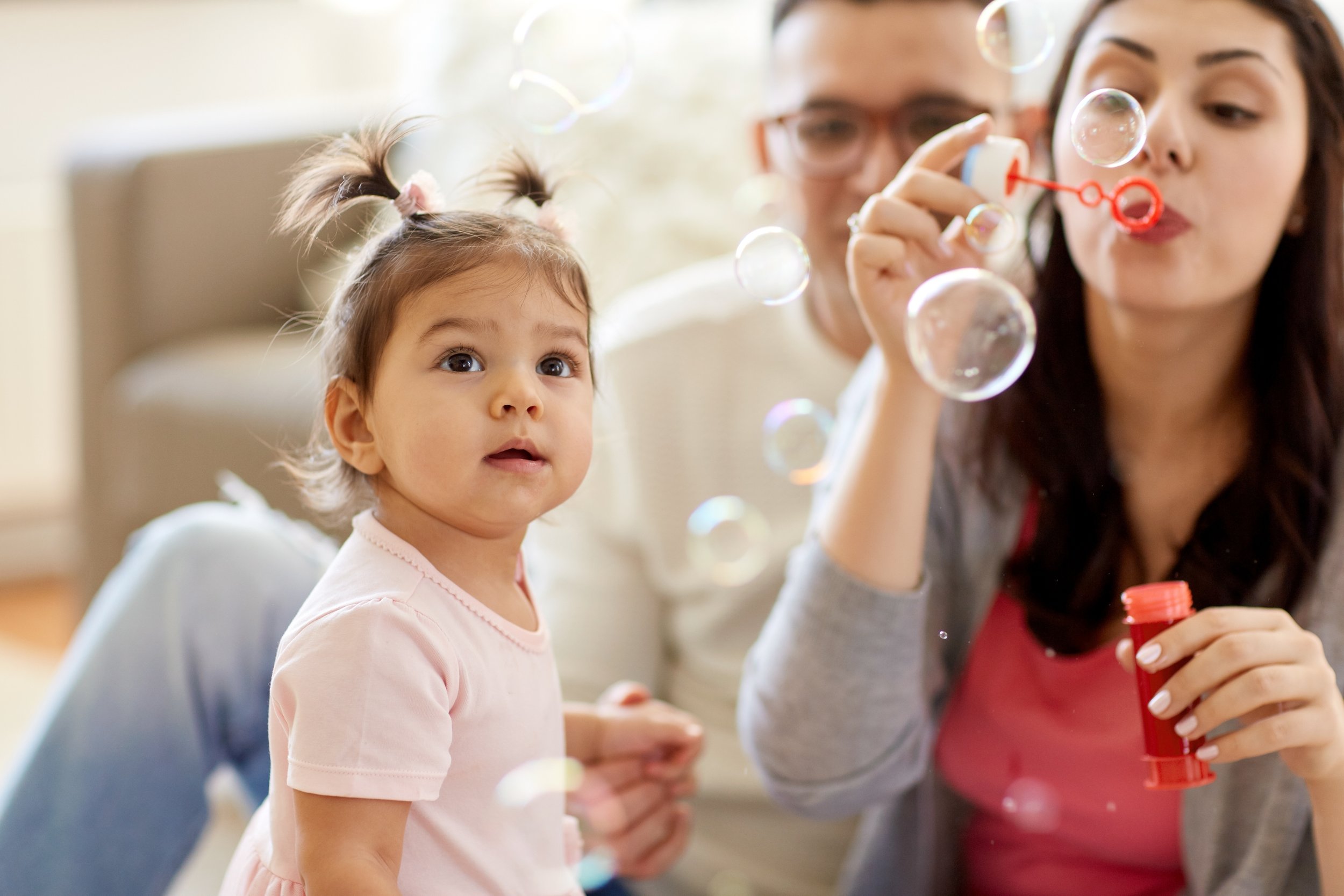How many words should an 18 month old say?
18 month olds usually say between 20-200 words.
There is a huge range of what is "typical" at this age.
While most toddlers will fall within the overall range for vocabulary size, some toddlers have spent a lot more energy on one area of development than others. For example, one toddler might have spent most of their effort learning motor skills (running, climbing), while their toddler friend used most of their developmental energy learning communication skills. These two toddler friends may look very different at 18 months, but they will both develop skills across all developmental areas and begin to look more alike from a developmental perspective in preschool and elementary school.
Regardless of how many words an 18 month old can say, we as speech therapists look for children who are 18 months old to be learning new words regularly. This is a time of rapid vocabulary growth for toddlers!
Knowing how many words your little one says is often harder than we initially think. I will include a link to our free Vocabulary Tracker below so you can easily count your toddlers vocabulary size and give them credit for all the words they are saying.
The Toddler Talk Vocabulary Tracker!
Keep reading for a more detailed answer about important expressive language milestones, like when babies start talking, learn about vocabulary benchmarks throughout toddlerhood, and what you can do if you're worried about your child's vocabulary development.
When will my baby start talking?
Great question!
First we need to answer the underlying question: what does it mean to “learn to talk?” Does that mean the child can say a single word? A few words put together? A single word but it has to sound really good? What about if it sounds like a real word, but you’re not sure that’s what the child means? When you have a young child, many or all of these questions may be running through your head.
Here’s an example!
When your young child is sitting in their high chair, the remains of lunch in their hair and on the dog, and your child says says “dah!”, you may be wondering Did you just say something?
Well, the answer is, maybe. There is no official concrete rule that speech-language pathologists (SLPs) use to define a first word, but there are some common criteria. Used together, you can say with relative certainty that something can be counted as a word:
The child says the same sound combination (or baby sign) to mean something specific AND
They can say it on their own without having to directly copy someone AND
They have done this three times
So when the child (spontaneously) says “dah!” and is looking at your sweet puppy, dutifully licking baby food off of the ground, it is possible they are saying dog.
Later that day, the dog barks at the mail carrier and your child again says “dah.” And last, your child watches you pour kibble into a dish in the evening while your dog looks on and they comment, “dah.” In this instance, the child did not use “dah” for lots of other stuff during the day (a sippy cup was NOT called “dah”, nor was a diaper, shoes, blanket, etc.). They said it on their own without having to copy you.
Once they said it three times, congratulations! It is official! Your child has said their first word!
Most children will say their first word between the ages of 10-14 months.
Sometimes early words might sound like each other. That’s because babies and toddlers are still learning and practicing, so their speech doesn’t sound great yet. This is especially common for toddlers around 15 months. For example, “dah” might apply to other words that sort of sound the same, like “Dada.” That’s okay. It takes some time before their talking starts to sound better. All new language skills take practice!
Okay, but when will my child start to talk?
Well, the quick answer to this question is that a first word (as defined above) usually appears between 10 and 14 months.
Before that, you will (typically) hear babbling. At first, babbling will be sort of simple and it will be the same syllable repeated (ba-ba-ba). Then, it will get a little fancier and some of the sounds will get changed up (like ba-ba-da-da-ba-da). Then, the child might start adding some tones (ba-da-ga?) and you get to that stage where parents think, wow, that sounded like a real sentence!
Babbling will continue while they are starting to say real words too. Sometimes, babbling sounds just like a real word but maybe isn’t yet (you think to yourself, he just said “da-da-da-da-da” and his daddy isn’t even here!).
Wait to count it as a word until you can tell for sure that that is what he means.
When will my child start putting 2 words together?
The quick answer is 18-20 months is when many children start putting words together.
By 24 months, an SLP would want to see frequent word combinations of at least 2 words, but some combinations might be longer.
To count as a word combination, the words in the combination have to be learned separately. For example, when children say “all done”, is that one word or two? Usually, kids learn “all done” as a single word/ idea. This is called a frozen phrase. Although adults know that there are *technically* two words in there, the child only ever hears them together and their brain knows it as a single idea (“AllDone.”)
They might combine AllDone with other words though (“water AllDone”, “AllDone cereal”), making some nice two-word combinations. Some other common frozen phrases might be I love you, where’d it go?, I see you!, thank you.
The more diverse a child’s vocabulary is, the more types of combinations they can make.
As we all learned in school, it’s hard to make a sentence without a verb! If your child only knows how to say nouns, they will be pretty limited in the types of sentences they can make (“milk cup”, “mama boat”). Being able to use plenty of helping words (like “more”, “help”, “please”, “done” as well as action words like “eat”, “wash”, “cut”) is nice in order to make a larger variety of sentences (“more milk”, “go car”, “doggy eat”, “help shoe”, “wash foot”).
Suggested: Teaching your child to put 2 words together
Okay, now let’s review our toddler vocabulary benchmarks.
|
By 6 months old… |
…babbling starts (and continues even after words appear.) |
|
By 10-14 months old… |
…first words appear. |
|
By 14-18 months old… |
…vocabulary starts to develop. Typically children use at least 20 words by 18 months, but many will have 40 or even more. |
|
By 18-20 months old… |
…simple word combinations start to appear. |
|
By 24 months old |
…children are often combining words in 2-3 word sentences. They have expressive vocabularies of at least 100 words, but many will have over 200. |
If you want to learn even more communication benchmarks for your child’s age, check out our free communication checklists that I will link here:
What should I do if I’m worried about my child’s talking?
First of all, you are not alone! Many children are late talkers and benefit from some extra help to learn to talk.
Kids as young as 18 months (and sometimes even younger) can start to get speech therapy with their parent to learn some tips and tricks to speed up the talking. Early intervention for language is extremely beneficial to help reduce frustration (for kids and their caregivers) and helps kids get on the right track for when they later go to school.
You can ask for a referral from your pediatrician for a speech-language evaluation. There are also many (often free!) early intervention services throughout the country for kids under the age of 3. You can search “early intervention YOUR CITY/COUNTY/STATE” to find these services. Different states/counties have named their programs differently, but most have a system in place to get a child evaluated and potentially provide free speech therapy, as well as other early intervention services.
Anticipating your child’s first words and early vocabulary is an exciting time! Be encouraged that as your child begins to make sounds (babble) and then say occasional words, and then as you hear words/phrases more frequently, these are all wonderful foundational steps to having a complete conversation with your toddler.
Here are some other questions parents frequently ask:
-
At 18 months, listen for a toddler to say at least 20 different words.
-
The average vocabulary size of 18 month olds is between 70-100 words according to the data collected from the MacArthur Bates CDIs (Feneson et al., 2007)
-
Children typically start using simple word combinations (2 words) between 18-20 months old.
So it’s okay if your 18 month old isn’t talking in sentences yet.
By 24 months, when the number of words children can say is elevated, listen for toddlers to be using several different word combinations with 2 or more words.
-
Yes, babbling is normal at 18 months. Babbling is one of the ways that children continue to practice with their speech (aka pronunciation) skills as the number of words they say continues to increase.
In addition to babbling, 18 month olds should be saying many different words. They may be talking in their own language, which is another way they practice their language skills.
-
Many parents are still waiting for first words at 18 months. And while it’s true that some children who are late talkers will “catch up” on their own, there are a significant percentage who will struggle with language development without more direct learning of language skills.
A speech and language evaluation is the best next step if you are concerned because your 18 month isn’t talking. Speech therapists are trained experts and able to teach you the best strategies to help support your child’s language development.
Key Take Aways:
Babies start talking, or say their first word, around the time of their first birthday.
Toddlers most often start saying 2 words together between the ages of 18-20 months.
If you are worried because your child isn't talking yet, be sure to talk to your pediatrician. They can help you figure out if a speech and language evaluation could help support your child's development.
Written By: Stephanie Burgener-Vader, MA, CCC-SLP
© 2020-2025. Stephanie Keffer Hatleli, MS CCC-SLP. All Rights Reserved.The content offered on ToddlerTalk.com is for informational purposes only. Toddler Talk is not engaged in rendering professional advice, whether medical or otherwise, to individual users or their children or families. No content on this site, regardless of date, should ever be used as a substitute for direct medical advice from your doctor, speech language pathologist, or other health professional. By accessing the content on ToddlerTalk.com, you acknowledge and agree that you are accepting the responsibility for your child’s health and well-being. In return for providing you with information related to home speech and language practice, you waive any claims that you or your child may have as a result of utilizing the content on ToddlerTalk.com.







